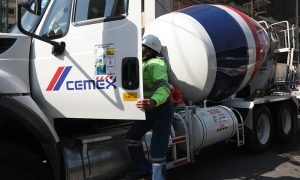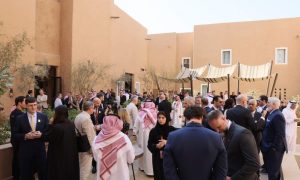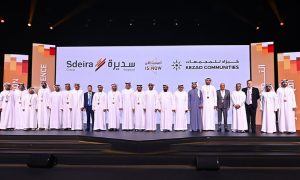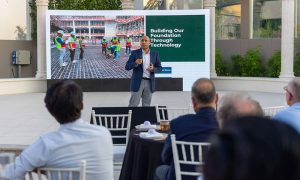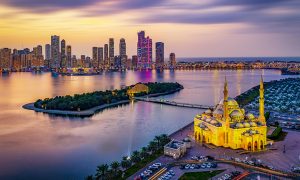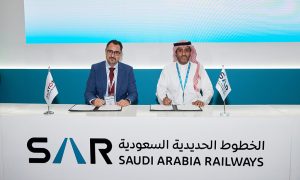Staying attached
Gaby Rhayem looks back at a tumultuous 18 months in the region and sees plenty of reasons for Doosan to continue its startling progress. “First thing in the morning, I’m drinking my coffee and the first thing I do is check…” Gaby Rhayem, checking himself, he grabs his nearby laptop. “I look to the news […]

Gaby Rhayem looks back at a tumultuous 18 months in the region and sees plenty of reasons for Doosan to continue its startling progress.
“First thing in the morning, I’m drinking my coffee and the first thing I do is check…” Gaby Rhayem, checking himself, he grabs his nearby laptop. “I look to the news on Construction Machinery website. I’m using it a lot. In fact I send it to my team and I say…this is interesting. I am an addict to the title!”
Rhayem is a charmer, but Doosan’s regional director has been generously spreading his brand of positivity in the heavy equipment industry for many years. Under his guidance Doosan Infracore Construction Equipment – which includes the colossus orange machines, the famous Bobcat compact range of equipment and attachments, and the recently rebadged Moxy ADT range – the Korean company has gone from strength to strength in the region.
He can now look back with some satisfaction at the work so far and be typically upbeat about what is to come from Doosan’s ongoing assault on the market. With a wide area to cover and a lot to say and sell he is understandably upwardly mobile.
“It’s crazy. Tomorrow I’m travelling to Saudi, then Qatar. I’ll then come back and next week I’ll be at a workshop in the Czech Republic.
There we have our annual EDAC, our Europe dealer advisory council. We have presentations from dealers, from everywhere. For the Middle East, we’ll have one for Doosan and one for Bobcat. There we can talk about what has happened through the year – what’s happening, what’s good, what we can do better.”
These discussions he says are vital, open exchanges between manufacturer and dealer.
“They can tell us. Guys on this point you are good but also this is what you must improve and you must see what the others (other manufacturers) are doing.”
He reminds me, the last time we met was at DICE’s launch of the new branding for Moxy in Molde on the eastern coast of Norway. That week coincided with the last EDAC, where company president Tony Helsham was present.
“Dealers there told me, look at this operation,” he gesticulates at an invisible competitor. “They have aftermarket and parts, etc. You need to be doing this in the Middle East. They are pushing us and challenging us.”
Rhayhem values the openness of these discussions and says the company is pushing to meet those expectations. “We want to be in the top five [of global manufacturers].”
His own finely tuned remit involves looking after the Gulf nations and Egypt and Libya in Northern Africa. “I did have (the whole of) Africa as well but it was too much. In some places you don’t have more than two flights a week, so you have to spend ten days.
“However there is a boom in Africa and so we decided to split it with the Middle East.”
With both Libya (a country where South Korean contractors had billions of dollars worth of projects underway before the civil war broke out) and Egypt experiencing their own difficulties in the past 18 months he seems briefly downbeat about their current situation, if not their future prospects.
“We had a lot of hopes for Libya but then we had the political situation and security has not improved there at all,” he says. “After the civil war everybody has a gun – if I look at you and don’t like you, I will shoot you. I called my dealer and asked whether he wanted me to come and he turned around and said, if you come and they will kidnap you. [He laughs] He told me, he doesn’t have the money to come get me!”
Before the war DICE’s brands had strong demand from South Korean and Libya contractors in the country, he explains.
“Libya was a big country for us as Gaddafi was under pressure and releasing funds for big projects. In two years we went from zero Bobcats to 150, the year before they got rid of him.”
He adds: “I hope I am wrong but I can’t see it improving there until the second half of next year. Without security, people will not put money there.”
While he is worried for the construction industry and Libya’s short-term prospects, he sees a brighter situation in its neighbour Egypt.
“I tell you why,” he states. “They have a new president. It doesn’t mean that the security is better but Egypt will get money from the IMF for $4 billion [agreed as CMME went to press] and Egypt is going to be back. 2013 will be okay and we see business come back.”
The past two years have been a tumultuous period for the region and Rhayhem’s travels have given him a unique perspective on how the region is evolving. Turning his attention to Syria, where Bobcat had previously been winning a number of cleaning contracts, he sees a country under immense hardship but still capable of a settled future: “I am sure that once it is over, then the investment will come which will have a good impact on countries such as Iraq.”
The challenge for the company has been to replace what he estimates could have been up to 500 machines in those countries. Fortunately for DICE, it is among a group of companies that benefit from a wide geographical spread and a developed presence in the buoyant Saudi Arabian market.
“Last year and this, Saudi was 70% of our business in the Middle East,” he says. “And this will be still going next year, maybe even more. There are too many projects and too much to be done. Everybody is taking a profit. I would say there is even a shortage of machinery. Even with used machinery. Even the Chinese are happy with Saudi. Everybody is doing good business in Saudi.”
DICE’s operation in the region is centred around its Jebel Ali office. Being close to Dubai is a reminder of how quickly things can shift even in a booming market. However he sees no reason to view the market with trepidation.
“Saudi is different for a couple of reasons,” he says. “Firstly, when you have a project in a country you need to be sure you have the income for the project. Well, Saudi is the number one oil producer in the world at 5 million barrels per day, the second is what? 3.5 or something like that.
“Secondly it is a very huge country with little infrastructure and few connections between cities. So you have rail expansion. Don’t forget Mekkah either. For Hajj, we had between 150 to 200 Bobcats working 24 hours per day cleaning. Wheel loaders are too big for this work and you have to keep the city clean. The machines working for the month are doing the equivalent of one year. Plus, the government wants to give its people houses. The buildings are old and they have to invest.”
While DICE can see its Bobcat and Doosan brands continue to grow in the region, he says that it is its attachments range (now numbering close to 100 for skid steer loaders) that ensures that it will maintain its momentum. He considers it a major advantage. He uses the example of wheelsaws in Saudi Arabia which are used to cut 80cm trenches for electrical lines as a sign of their popularity.
“We have said from the beginning that we have a solution beyond your expectation. Our attachment range stretches from snow to sand: construction to agriculture. We can go to our customers and say what do you want to do?”
Bobcat – an identifiably US marque – has kept its branding as DICE looks to cash in on the name but this has not been the case for Moxy which has been absorbed into the Doosan brand. Does being a South Korean carry any weight with Middle East buyers?
“Ten years ago when you talked about Korean brands, people said no, no we want Japanese. Televisions, phones, who is the number one today? Samsung. Where are the Japanese now?” He questions.
“However Doosan has to prove that the machine is reliable, so we encourage people to put it beside the competition. If they are worried that is coming from Korea, I tell them I want to guarantee the machine; I’ll give you an extended warranty. We can also now tell people we have the same infrastructure as the competition.”
That infrastructure is supported by some strong dealers in the region. Saudi Diesel in particular has proven to be an effective partner helping to share 50% of the excavator market in the Middle East with its nearest rival.
“In Saudi we are now number two in excavators, number two in wheel loaders. The people who bought Doosan at the beginning were hesitant but Saudi Diesel understood, put in a lot energy and investment. When you have the right product and the right people, then you will succeed.”









